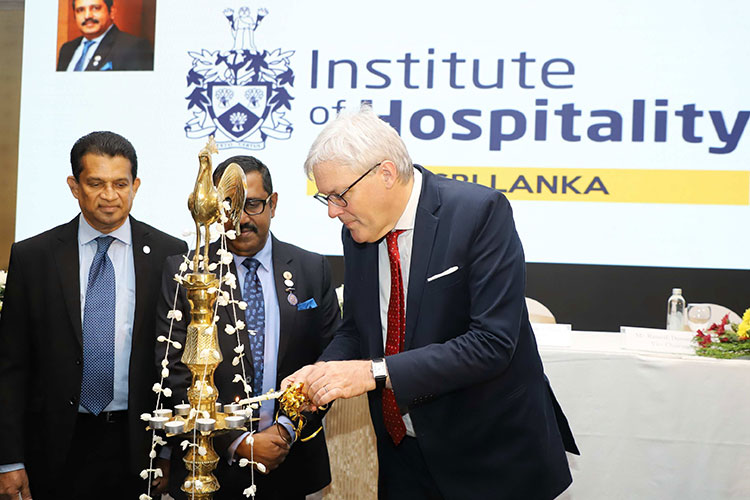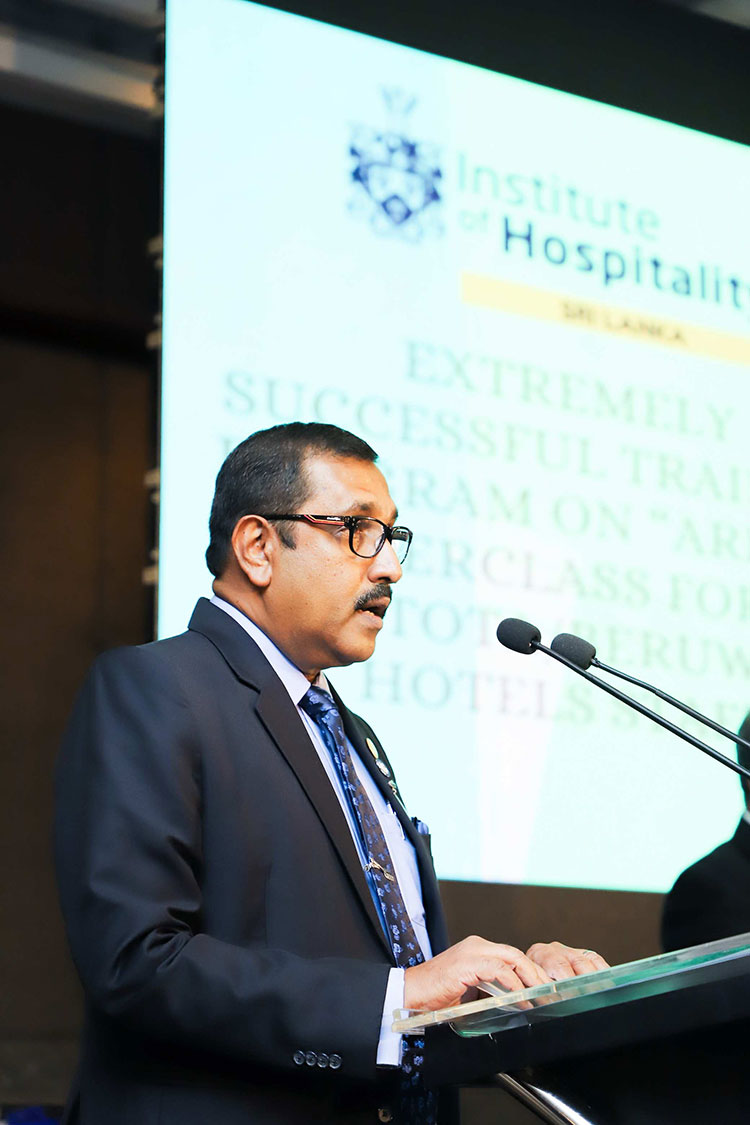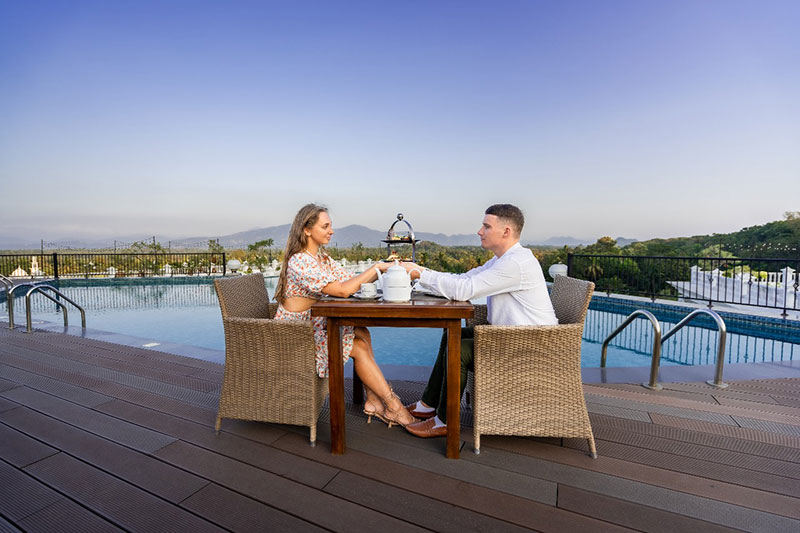Life style
Towards a disability-friendly health system
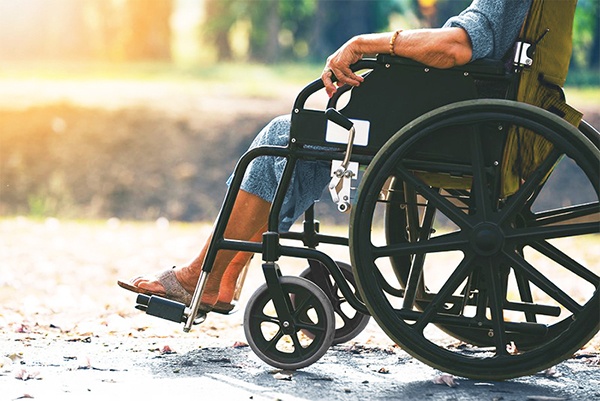
Gaps in the health care system burden those with disabilities with an added cross. In the backdrop of the International Day of Persons with Disabilities which fell on December 3, we spoke to many stakeholders to push for collective national interventions to enhance the quality of life of those with disability.
by Randima Attygalle
Nisha Shareef from Kandy was born with a rare spinal cord abnormality which left her wheelchair-bound for life. Introduced to rehabilitation at age 11, Nisha’s quality of life improved. Thanks to the vocational training she received through the Ragama Vocational Training School, she learned the art of watch-mending. Today at 50-years, she runs her own business in the Kandy town, her example empowering fellow wheelchair users.
 Health challenges for those in Nisha’s shoes are many. Inability to control the passing of urine, catheter and diaper dependency, frequent urine infections and bed sores are among them. Management of all these issues is costly says Nisha who lobbies for a special concession for adult diapers and other medication required by those with disabilities. “Accessibility to public toilets including those at hospitals is a nightmare for us,” she says. Nisha urges the health authorities to have disability-friendly infrastructure at hospitals and to dedicate a help desk and a hotline at least at Teaching Hospitals to assist those with disabilities.
Health challenges for those in Nisha’s shoes are many. Inability to control the passing of urine, catheter and diaper dependency, frequent urine infections and bed sores are among them. Management of all these issues is costly says Nisha who lobbies for a special concession for adult diapers and other medication required by those with disabilities. “Accessibility to public toilets including those at hospitals is a nightmare for us,” she says. Nisha urges the health authorities to have disability-friendly infrastructure at hospitals and to dedicate a help desk and a hotline at least at Teaching Hospitals to assist those with disabilities.
Many young girls and women with mental disabilities and those who are vision impaired left alone at homes are often sexually exploited, she points out proposing a state-supported day-care system to shelter them while their parents or other care givers are at work. This would help ensure their safety.
Having fallen off a rambutan tree at ten, Lasantha Chandimal from Dampe off Madapatha, became paralyzed. Having lost both his parents by 15, Lasantha’s life took a turn for the worse. The Samaritans at the Ragama Rehabilitation Hospital not only uplifted him from a bedridden patient to a wheelchair user but also trained him to maneuver a special tricycle. Lasantha, 36-years old today, has lost his job with the closure of the plastic factory he worked at. His wife, a wheelchair user herself, also worked there.
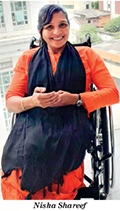 A spinal cord injury makes Lasantha often susceptible to kidney dysfunction. “I’m a catheter-user and I developed a urine infection during the lockdown which left me helpless with no access to medical treatment. With my temperature running high due to the infection, I called for an ambulance several times to no avail. Finally I had no choice but to scrape my savings and get treatment at a private hospital.”
A spinal cord injury makes Lasantha often susceptible to kidney dysfunction. “I’m a catheter-user and I developed a urine infection during the lockdown which left me helpless with no access to medical treatment. With my temperature running high due to the infection, I called for an ambulance several times to no avail. Finally I had no choice but to scrape my savings and get treatment at a private hospital.”
The absence of special assistance at OPDs, indifference of the support staff and exploitation of those with disability by some, makes matters worse. Improving disabled-health literacy at ground level, improving sanitation facilities for people with disability in hospitals, sensitizing support staff and creating awareness on available help devices are among Lasantha’s suggestions to ease the burden of this community.
Over a billion of people, about 15% of the world’s population, according to the World Health Organization (WHO) have some form of disability. Half those with disability cannot afford healthcare, compared to a third of those without disability. People with disability are more than twice as likely to find healthcare providers’ skills inadequate and people with disability are four times more likely to report being treated badly; and they are nearly three times more likely to be denied healthcare, WHO affirms. The World Bank literature on ‘Disability Inclusion’ documents that ‘many persons with disabilities have additional underlying health needs that make them particularly vulnerable to severe symptoms of COVID-19, if they contract it. Persons with disabilities may also be at increased risk of contracting COVID-19 because information about the disease, including the symptoms and prevention, are not provided in accessible formats such as print material in Braille, sign language interpretation, captions, audio provision, and graphics.’
Translating sensitization on ‘disability and rehabilitation’ into practical reality is urgent, points out Manique Gunaratne, Manager Specialized Training and Disability Resource Centre of the Employers’ Federation of Ceylon. Manique who lost her vision in her 20s due to Retinitis pigmentosa had no proper local guidance to a rehabilitation system. The overseas doctors whom she consulted empowered her on ICT systems available for vision impaired people. “This has made me what I am today,” says the activist who lobbies for help desks which could offer guidance for people with disabilities and their families to make informed decisions. “Very often when a child with a disability is born, parents have no clue what to do with it. If the medical condition turns out to be disability, they are even more helpless,” notes Manique who also proposes a ‘Priority Card’ on health nee
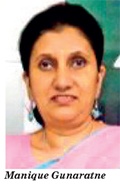
ds and making disability representation stronger at policy-level within the health sector.
The role of collaboration between doctors, physiotherapists and the beneficiary in determining the best assistive device cannot be understated says H.D. Mala Nandani, Administrative Officer, Rehab Lanka which manufactures s
uch devices. “An assistive device has to be a customized and very often there is little awareness among the poorest of the poor who depend on a donated wheelchair which could very often compound the disability.” The National Secretariat for Persons with Disability provides a stipend for such devices, she adds. The local manufacturing volume of assistive devices should be increased for better availability, notes Mala who lost the use of one leg due to a vaccination mishap as a child. “At ground level, the knowledge of personal hygiene among those with disabilities is very poor; hence there should be a system similar to that of midwives to help the families of the disabled in terms of knowledge and guidance to proper health channels.”
The COVID emergency situation which put the local public health system under unprecedented strain has driven the health authorities to design new interventions including meeting the needs of people with disabilities, notes Dr. Shiromi Maduwage, Consultant Community Physician from the Youth, Elderly and Disability Unit of the Ministry of the Health. “We are now developing a system to reach out to those in need in future emergencies. We have already launched a programme to empower care givers during the pandemic. This is facilitated by the National Secretariat for Persons with Disability.
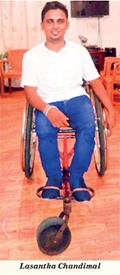
“
A system to improve the COVID-related health messages through Braille and sign language is also underway she says. While the state provides a monthly disability allowance, certain gaps in the system including the need for disabled-friendly infrastructure have been identified; and these need to be bridged, says Maduwage. “The elderly population is growing and disability will be an added burden. Community based rehabilitation is already being strengthened by the health sector to mitigate the challenges and ground level officials sensitized though the MOH divisions.”
Upgrading the school curriculum to incorporate health issues of those with disabilities including their sexual an
d reproductive health and safety can help sensitize future health policy makers to
catering for their needs, remarks Dr. Harischandra Yakandawala, Medical Director of the Family Planning Association and Consultant to the project on sexual and reproductive health during emergencies. “People with disabilities often have barriers in accessing information and we are collaborating with several agencies in addressing this including making online counseling services accessible by victims of gender based violence.” Women and girls with disabilities are the most vulnerable to sexual violence which could result in unwanted pregnancies and sexually transmitted diseases, he says citing the need for organized shelters to provide care for young girls and women enabling their caregivers to be productively employed during day time.
Encouraging all parents to “dream for their child” despite odds, Samanmali Sumanasena, Professor in Paedeatric Disability and Head of the Department of Disability Studies, Faculty of Medicine, University of Kelaniya, urges all partners in paediatric health services to support families with children with mental and physical disabilities. “Research shows that early intervention can make children more cognitively competent and they can be developed into very productive citizens”. In this process, access to correct information, proper referral systems, child intervention services, updated technology for optimum benefits, access to general health care and family support systems are imperative, she says. Training parents and caregivers to routinely intervene to improve their children’s quality of life is important, she points out. Lack of specialists who
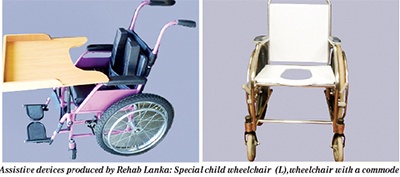
can address the concerns of children with special needs in the country is a major bottleneck in enabling wider reach. The Special Needs Programme which was launched in Colombo District in July to meet this challenge is being expanded to the rest of the island as well, says Prof. Sumanasena.
Rehabilitation which is recognized as a human right by the United Nations’ Convention on the Rights of Persons with Disabilities, improves the functioning status of people with disability to achieve the highest possible functional outcome, notes Dr. Sachithra Adhikari, Acting Consultant in Rehabilitation Medicine from the Rheumatology and Rehabilitation Hospital, Ragama.
“Lack of an established care pathway directed towards rehabilitation following initial treatment of disability, is a major drawback. Rehabilitation services are provided only by a few hospitals which hardly meet the need.” She goes on to note that the need to generate awareness on the importance of rehabilitation and its cost benefit both among the healthcare professionals and the public is urgent. Drawing attention to limitations in available rehabilitation personnel and infrastructure, she said the lack of coordinated service provision, leadership for financial and administrative support required for rehabilitation service are problems that need addressing. Also, social acceptance of those with disabilities rather than mere sympathy is important together with sensitivity to their plight.
Life style
Camaraderie,reflection and achievements

Institute of Hospitality Sri Lanka
 The 32nd Annual General Meeting (AGM) of the UK-based Institute of Hospitality’s Sri Lanka Chapter was held recently at the Ramada Hotel Colombo,.The event provided an evening of camaraderie , reflection of the past and present achievements,setting new benchmarks for the future
The 32nd Annual General Meeting (AGM) of the UK-based Institute of Hospitality’s Sri Lanka Chapter was held recently at the Ramada Hotel Colombo,.The event provided an evening of camaraderie , reflection of the past and present achievements,setting new benchmarks for the future
The AGM had the presence of two distinguished guests, the Chief Guest Opposition Leader Sajith Premadasa, and the Guest of Honour British High Commissioner to Sri Lanka, Andrew Patrick. Their inspiring speeches were lauded by all hoteliers who were present at the occasion
A special thanks was extended to Robert Richardson, CEO of the Institute of Hospitality UK, along with his team, sponsors, committee members, and all attendees for making the event memorable.
Dr. Harsha Jayasingh, Past President of the Institute of Hospitality (UK) Sri Lanka Chapter, emphasised the Institute’s longstanding history and the strength of its Sri Lankan branch. “The Institute of Hospitality (IH) UK has a history of 86 years, and we are proud to be the Sri Lanka Branch. IH Sri Lanka is much stronger now with many members from all areas of the hospitality industry,” he stated.
Dr. Jayasingh highlighted the significant role of tourism in Sri Lanka’s economy,. He said tourism it is the third-largest source of revenue for the country. “Tourism accounts for about 13.3% of total foreign exchange earnings and employs 450,000 people directly and indirectly. The hospitality industry in this island of pearl holds tremendous potential for economic growth, job creations, and cultural exchange,” he added.
He also pointed out more women should be attracted to the industry and advocated for the use of technology in hospitality sector to attract the younger generation.
The newly appointed Chairman Ramesh Dassanayake spoke about the challenges faced by the industry, including the reluctance of youth to join the sector. . Dassanayake expressed concerns over the migration of staff between hotels and the overall ‘brain drain’ in the sector. ” We must maintain high standards in the hotel We must try to attract tourists to Sri Lanka, we must have with many facilities Hence, hotel schools and other professional institutions involved in skills development mustincrease their intakes,” he pointed out.
Chief Guest Sajith Premadasa emphasised the importance of eco tourism and said “We need to have an environmental policy related to tourism in place,” . .
The 32nd AGM of the Institute of Hospitality UK, Sri Lanka Chapter, was a testament to the strength and potential of Sri Lanka’s hospitality industry. The insights and commitments shared during the event set a new benchmark for the future.(ZC)
Pix by Thushara Attapathu
Life style
He recognizes human identity beyond boundaries of gender, race, nationality and religion.
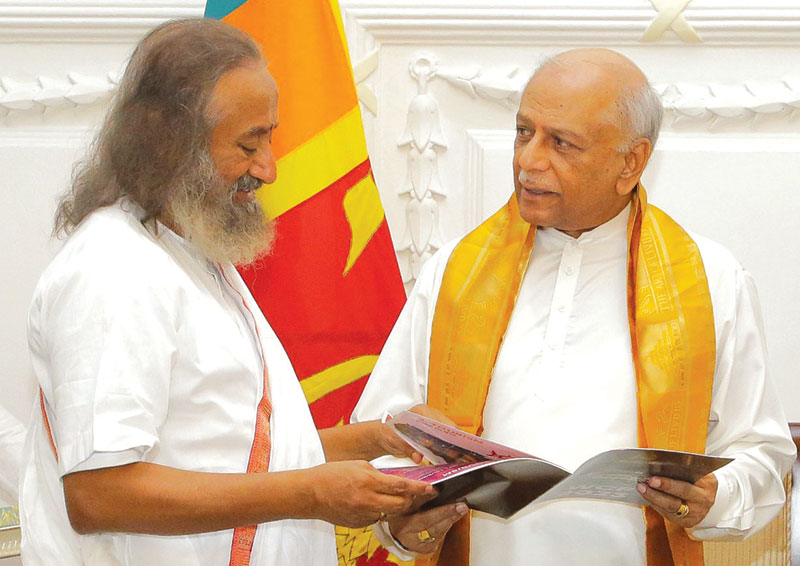
Visit of Sri Gurudev to Sri Lanka
Humanitarian, spiritual leader and Global Ambassador of Peace Gurudev Sri Sri Ravi Shankar (Sri Gurudev) was in Sri Lanka on a three day tour on the invitation of the Prime Minister of Sri Lanka Dinesh Gunewardene. Gurudev who inspired a wave of volunteerism and service to moot one of the largest volunteer-based organisations in the world – The Art of Living – visited the various projects under the aegis of the foundation and launched twelve vocational and technical centers around the island. He was accompanied by thousands of followers from Sri Lanka and around the world.
Gurudev who visited Sri Lanka for the sixth time also had a first day cover launched in honour of his visit. He is a strong proponent of spreading happiness, using the unique Sudarshan Kriya, yoga, meditation and practical wisdom to unite people, empower individuals and transform communities. His programmes provide techniques and tools to live a deeper, more joyous life, while his non-profit organisations recognize the human identity beyond the boundaries of gender, race, nationality and religion.
The Art of Living which has more than 30,000 teachers and over one million volunteers across 180 countries has touched in excess of five hundred million people around the world. CNN called it “Life Changing” and The Washington Post headlined it, “Fresh air to millions”.
In Trincomalee, Gurudev met with war victims and had a heartwarming engagement with the children from the children’s homes run by the Foundation. He also visited the Koneswara Temple in Trincomalee and graced the Kumbhabhishekam at Seetha ecogPnize the human identity beyond the boundaries of gender, race, nationality and religion. Amman temple at Nuwara Eliya. He held discussions with the trustees on the progress of the foundation’s social service projects, while also holding a special event – Ekamuthuwa – attended by a large number of dignitaries and his devotees from around the world.
His time with the Prime Minister was spent discussing the prospects of unity in diversity and uniting Sri Lanka by adding happiness into the formula of living. In addition he had discussions with the Speaker of the Parliament of Sri Lanka Mahinda Yapa Abeywardena, prominent business stewards and civil society leaders.
Life style
Bridal shows with opulence and luxury at The Epitome hotel in Kurunegala
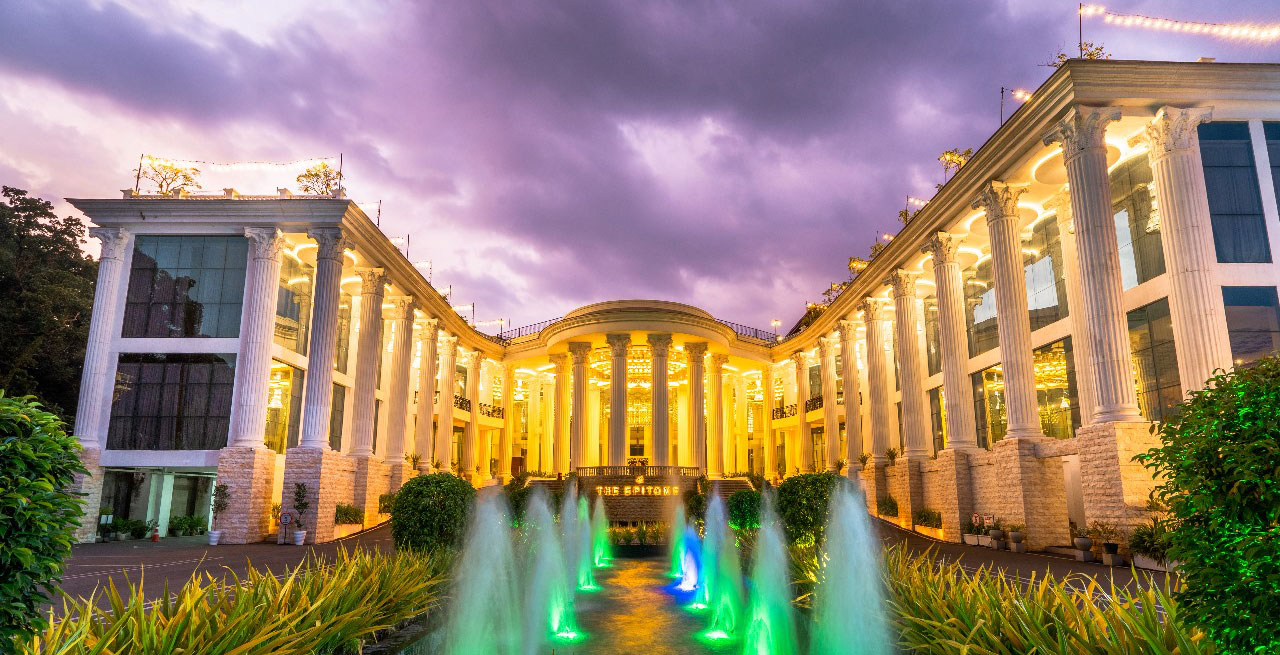
by Zanita Careem
Envison your dream wedding day come to life at the Epitome Hotel, a prestigious city hotel in Kurunegala offering an unrivalled luxury rendors experience for weddings.
The venue is designed to embody opulence and luxury from all quarters for a spectacular wedding in kurunegala,Thier ballroom is the largest banquet facility in Sri Lanka It can be divided into six luxurious pillarless wedding halls on the ground floor and 25pax smaller banquet halls.
It can be easily named as a five star heaven in the heart of the city contributing to a myriad of immense experiences tailored to inspire and delight wedding experiences.
From opulent décor set up to exquisite table decor, lavish food, every detail is meticulously curated to spark your imagination and ignite creativity for a perfect wedding. The previous prestigious wedding shows season one and season two attracted large crowds
were unique events which gave the wedding vendors and potential clients had an opportunity to connect and interact with each other. Beyond being a showcase it was a chance for the wedding vendors to unite and contribute to the vibrancy of the wedding industry. The wedding show covered all area of the bridal industry providing a comprehensive variety of bridal supplies from Sri lanka and became the most popular bridal exhibitions in Kurunegala.This bridal exhibitions allowed brides and grooms to experience first hand the products and services available from suppliers in Sri Lanka
These wedding shows held at The Epitome created a benchmark and gave an opportunity for vendors to create connections to the utmost satisfaction said Harshan Lakshita Executive Director. of the magnificent Hotel
Our wedding shows featured experts and professionals in every field‘ It covered all areas of the bridal industry provided a comprehensive variety of bridal supplies from Sri lanka and became most popular bridal exhibition in this region.We are always open to everyone to join us at our wedding shows in the future. It is an opportunity to discover the incredible talent within our local wedding and bridal vendors to make meaningful relationships and plan thier special day at our breathtaking hotel The Epitome said General Manager Kavinda Caldera
The Epitome Hotel’s bridal show which will be held end of June will buzz with great ideas,advice and inspiration for all those who plan thier dream wedding
…….
The Hotel Epitome’s Wedding Season 3 will marked excellence, celebration and inspiration for those in the wedding industry. The exhibition halls will resonate with ideas on exquisite bridal wear to decor, florists , photography etc and showshowcase the rich tapestry of talent within the local wedding industry. .




